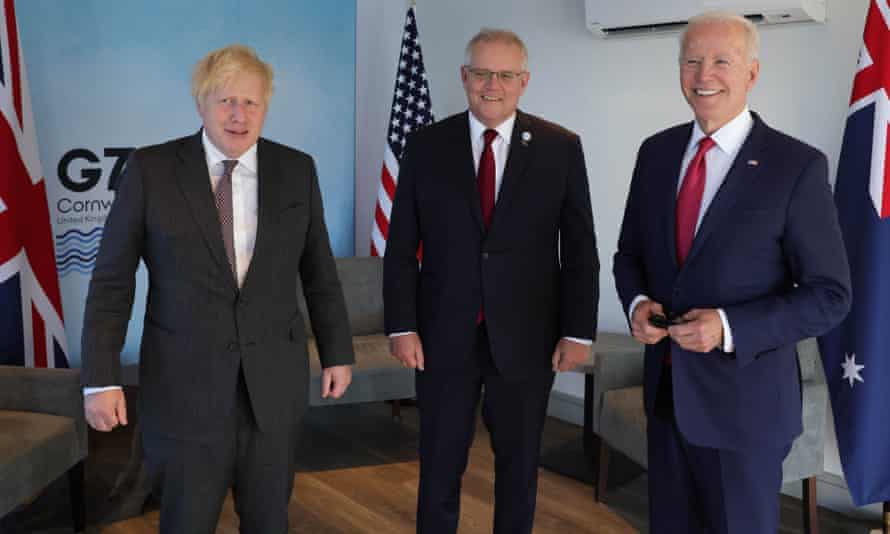Comment from White House shows there is a price to be paid: support for US-led stronger posture against Beijing

Britain’s post-Brexit foreign policy is taking shape, and the early moves are hardly very surprising: a tripartite defence alliance with the US and Australia – handily compressed to Aukus – clearly designed to send a message to Beijing.
The three start work by sharing with Canberra what is ultimately an American technology: supplying nuclear reactors to power submarines with the likely assistance of Britain’s Rolls-Royce and BAE Systems, a relationship that may also allow the Australians to ditch a troubled but lucrative A$90bn (£48bn) diesel engine agreement with a French contractor.
Australia’s new nuclear-powered submarines will not be nuclear-armed, and the country has no desire to be a nuclear power. But there are questions as to how precisely the enriched uranium required will be supplied and how the reactors will be decommissioned – or to put it another way, what will be done in Australia, the UK or the US. The three will spend the next 18 months trying to work it out.
In theory, it would have been perfectly possible for the US to work directly with their Australian counterparts on the sensitive technology transfer (a development so rare that it has only happened once before in history, when the US helped Britain start its own nuclear submarine programme in late 1958).
But as a senior White House official revealed, it was the UK that wanted this the most. “Great Britain has been a very strong strategic leader in this effort,” said one, speaking ahead of the announcement, helping “mediate and engage on all the critical issues” as the partnership was being thrashed out.
It is a vital endorsement after a tricky summer in which Anglo-American relations have been far from smooth during the Afghanistan crisis. British generals and ministers made little secret that they disagreed with Joe Biden’s decision to withdraw troops from the country, effectively handing it over to the Taliban.
There was a lack of understanding of the tactical intentions of the White House. British sources complained it was unclear when the US would pull out of Kabul airport, and Ben Wallace, the defence secretary, a survivor of Wednesday’s reshuffle, even appeared to question if the US had the will to be a superpower any longer.
Now at least, the prime minister, Boris Johnson, can head over the US for the UN general assembly, and his first White House meeting with Joe Biden, with something else to talk about.
But for the UK there will be a price. What the US president wants is for the UK to be more present in the Indo-Pacific, even though it is thousands of miles away from home. The submarine deal is, the White House official observed, “a downpayment” on the “concept of global Britain”.
In June, Biden came to Europe for his first overseas tour as president, wanting western allies to sign up to a stronger posture against Beijing. Nato, traditionally focused on Russia, obliged and agreed to declare that China also poses a security risk at its annual summit. Yet the White House wants to go further.
The Pentagon has hardly been shy in pointing out that China, which has its own nuclear-powered submarines, now possesses the world’s largest navy. The US has repeatedly wanted allies to help: over the summer Britain’s new Queen Elizabeth aircraft carrier participated in muscle-flexing military exercises in the Philippine Sea.
A serious confrontation with China remains unlikely, but this is not the point. With access to European markets not as friction-free as before, the UK is choosing to build a political and industrial strategy based in part on defence and helping longstanding but far-flung allies, starting with supplying nuclear-powered submarines.
